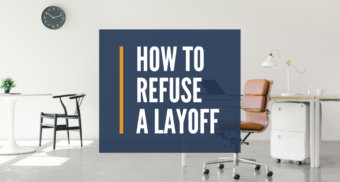Ongoing impact of COVID-19 on employment in B.C.

As Global News noted in a recent article, the Greater Vancouver Board of Trade recently conducted a survey of the ongoing impacts of COVID-19 on businesses in the region. According to the survey:
- 32 per cent of business had to cut down staffing to cope with reduced revenue
- 70 per cent of the businesses surveyed do not anticipate being able to bring a majority of their employees back until at least summer 2021
- Up to 10 per cent do not expect a majority of their employees to ever return
- 25 per cent of businesses will request or incentivize employees to receive a vaccine before returning to work
- Many businesses believe an increased amount of workers will work from home.
Although the ongoing pandemic has understandably led to difficulties for many employers, businesses and stakeholders, it has also lead to financial and emotional challenges for many affected employees.
Despite the ongoing COVID-19 pandemic, it is important for both parties to be up-to-date on their employment rights.
In this blog, we’ll focus on five areas related to rights for employees as BC continues to reel from the influence of COVID-19.
Termination Rights
In most cases when an employee is terminated without “just cause”, they are entitled to reasonable notice or pay in lieu of notice, which is more commonly referred to as severance pay.
The amount that an employee will be owed depends on many factors including their age, how long they have been working, their role and (if applicable) their employment contract.
The important thing to keep in mind is that just because COVID-19 continues to persist, it does not mean that businesses won’t still owe termination pay to employees in most situations.
Of course, there will always be exceptions to this rule. In other words, COVID-19 may change this for some employees, but not most.
Layoffs
If an employee has been laid off temporarily due to COVID-19, it is important to keep two things in mind:
- In most cases, a business is not allowed to simply impose a temporary layoff. In other words, the employee must agree to the layoff in most cases. If the employee has not agreed to the layoff, this could give rise to a claim of constructive dismissal.
- Even where a layoff has been agreed to, layoffs are normally only allowed to last for a maximum of 13 weeks. There are some limited exceptions, but generally a layoff beyond 13 weeks will not be allowed (aside from summer 2020, when BC extended the temporary layoff period to August 30th).
Changes in hours or pay
Despite the impacts of COVID-19, businesses generally cannot unilaterally change an employee’s hours or pay without the employee’s agreement.
An employee does not have to agree to such a change. In most cases, unilateral changes to an employee’s terms of employment (especially in a way that affects their pay) will give rise to a constructive dismissal claim.
Vaccination
The issue of whether employers can require that employees be vaccinated before returning to work is an issue that hasn’t been decided on yet in this context.
Therefore, it is likely to be highly fact-specific and will depend partly on the type of workplace involved.
In most cases, it is likely that a vaccine cannot be forced upon workers. However, there may be exceptions to this in more safety-sensitive roles.
SEE ALSO
• Can my employer force me to take a COVID-19 vaccine?
• Employment Lawyer on vaccines and employment rights
Remote Work
Working remotely is a trend that is likely here to stay, particularly for businesses that have taken steps to embrace remote work.
However, the fact that employees have been allowed to work remotely during COVID-19 does not necessarily mean that they will have a right to continue doing so after the pandemic subsides.
It is likely that such cases would be considered based on an individual employee or business’s circumstances (eg relocation, childcare).
For employees that working remotely, questions regarding privacy rights and protection of data will likely continue to apply.
SEE ALSO
• Costco employees asking to work remotely
• Can my employer force me to return to the office after working remotely?
As every case will depend upon its own facts, and the situation facing each business is different, we recommend that both employees and employers contact our experienced team in Alberta, British Columbia or Ontario for legal advice when dealing with any of these issues.




